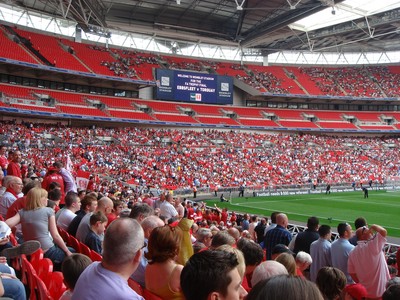
The FA Trophy is a knockout tournament held each season for non-league teams with professional players. Generally, this involves sides from the National League, National Leagues North and South, the Northern Premier League, Southern Leagues and the Isthmian League.
Much like the EFL Trophy gives lower league teams in the English Football League a chance to play at Wembley and win silverware, the FA Trophy provides non-league and semi-professional teams with an opportunity of lifting a cup at the national stadium.
The FA Trophy was launched in the 1969/70 season when Macclesfield Town, who were competing in the Northern Premier League, were victorious. They went on to complete a league and cup double. Their opponents that day, Telford United, are the cup’s most successful side with three wins in five finals but the club was dissolved after falling into bankruptcy, being reborn as AFC Telford United.
FA Trophy Winners By Year
| Season | Winner | Score | Runner–up |
|---|---|---|---|
| 2021–22 | Bromley | 1–0 | Wrexham |
| 2020–21 | Hornchurch | 3–1 | Hereford |
| 2019–20 | Harrogate Town | 1–0 | Concord Rangers |
| 2018–19 | AFC Fylde | 1–0 | Leyton Orient |
| 2017–18 | Brackley Town | 1–1 | Bromley |
| 2016–17 | York City | 3–2 | Macclesfield Town |
| 2015–16 | FC Halifax Town | 1–0 | Grimsby Town |
| 2014–15 | North Ferriby United | 3–3 | Wrexham |
| 2013–14 | Cambridge United | 4–0 | Gosport Borough |
| 2012–13 | Wrexham | 1–1 | Grimsby Town |
| 2011–12 | York City | 2–0 | Newport County |
| 2010–11 | Darlington | 1–0 | Mansfield Town |
| 2009–10 | Barrow | 2–1 | Stevenage Borough |
| 2008–09 | Stevenage Borough | 2–0 | York City |
| 2007–08 | Ebbsfleet United | 1–0 | Torquay United |
| 2006–07 | Stevenage Borough | 3–2 | Kidderminster Harriers |
| 2005–06 | Grays Athletic | 2–0 | Woking |
| 2004–05 | Grays Athletic | 1–1 | Hucknall Town |
| 2003–04 | Hednesford Town | 3–2 | Canvey Island |
| 2002–03 | Burscough | 2–1 | Tamworth |
| 2001–02 | Yeovil Town | 2–0 | Stevenage Borough |
| 2000–01 | Canvey Island | 1–0 | Forest Green Rovers |
| 1999–00 | Kingstonian | 3–2 | Kettering Town |
| 1998–99 | Kingstonian | 1–0 | Forest Green Rovers |
| 1997–98 | Cheltenham Town | 1–0 | Southport |
| 1996–97 | Woking | 1–0 | Dagenham & Redbridge |
| 1995–96 | Macclesfield Town | 3–1 | Northwich Victoria |
| 1994–95 | Woking | 2–1 | Kidderminster Harriers |
| 1993–94 | Woking | 2–1 | Runcorn |
| 1992–93 | Wycombe Wanderers | 4–1 | Runcorn |
| 1991–92 | Colchester United | 3–1 | Witton Albion |
| 1990–91 | Wycombe Wanderers | 2–1 | Kidderminster Harriers |
| 1989–90 | Barrow | 3–0 | Leek Town |
| 1988–89 | Telford United | 1–0 | Macclesfield Town |
| 1987–88 | Enfield | 3–2 | Telford United |
| 1986–87 | Kidderminster Harriers | 2–1 | Burton Albion |
| 1985–86 | Altrincham | 1–0 | Runcorn |
| 1984–85 | Wealdstone | 2–1 | Boston United |
| 1983–84 | Northwich Victoria | 2–1 | Bangor City |
| 1982–83 | Telford United | 2–1 | Northwich Victoria |
| 1981–82 | Enfield | 1–0 | Altrincham |
| 1980–81 | Bishop’s Stortford | 1–0 | Sutton United |
| 1979–80 | Dagenham | 2–1 | Mossley |
| 1978–79 | Stafford Rangers | 2–0 | Kettering Town |
| 1977–78 | Altrincham | 3–1 | Leatherhead |
| 1976–77 | Scarborough | 2–1 | Dagenham |
| 1975–76 | Scarborough | 3–2 | Stafford Rangers |
| 1974–75 | Matlock Town | 4–0 | Scarborough |
| 1973–74 | Morecambe | 2–1 | Dartford |
| 1972–73 | Scarborough | 2–1 | Wigan Athletic |
| 1971–72 | Stafford Rangers | 3–0 | Barn |
| 1970–71 | Telford United | 3–2 | Hillingdon Borough |
| 1969–70 | Macclesfield Town | 2–0 | Telford United |
Tournament Format
The FA Trophy may be a piece of silverware you are vaguely aware of but many football fans have little idea how exactly it works. Although far from the most prestigious cup a team can claim in the whole of England, it is still a big deal for the 300+ plus teams that attempt to win the prize each year. These competing teams come from between the fifth and eighth tiers of English football, so the first four steps of the National League System, which is below the English Football League (EFL) which in turn is below the Premier League.
With 310 teams all gunning for cup glory each year, the FA Trophy doesn’t have the most straightforward of structures. Although we provided a concise, written overview below, you may find it easier to digest the information by seeing the tournament format as a table.
FA Trophy Round by Round
| Round | Teams Entering (Tier) | Fixtures | Teams Remaining |
|---|---|---|---|
| First Qualifying | 38 (Tier 8) | 19 | 291 |
| Second Qualifying | 119 (Tier 8) | 69 | 222 |
| Third Qualifying | 87 (Tier 7) | 78 | 144 |
| First Round | None | 39 | 105 |
| Second Round | 43 (Tier 6) | 41 | 64 |
| Third Round | 23 (Tier 5) | 32 | 32 |
| Fourth Round | None | 16 | 16 |
| Fifth Round | None | 8 | 8 |
| Quarter-Finals | None | 4 | 4 |
| Semi-Finals | None | 2 | 2 |
| Final | None | 1 | 1 |
Qualifying Rounds
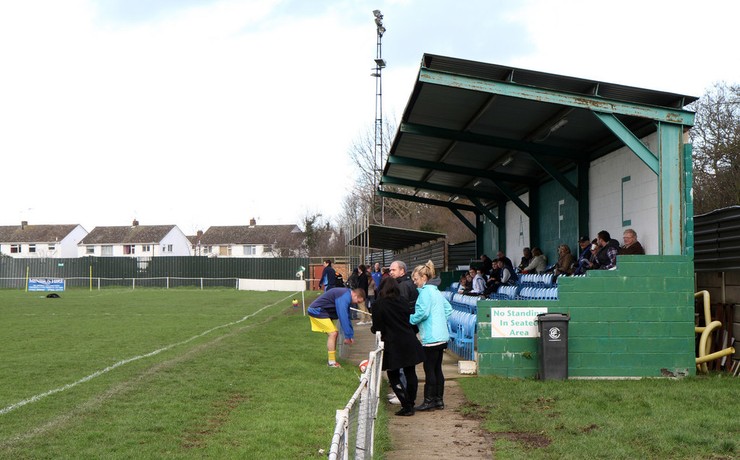
Before we get into what is known as the first round proper, the FA Trophy features three qualifying rounds reserved for the lowest tier sides. The first round of qualification involves 38 teams drawn from the eighth tier of English football to create 19 knockout matches. As the eighth tier spans six divisions, this is only a fraction of possible sides but some have to start a round earlier for the structure to function properly.
The remaining eighth tier sides, of which there are 119, join the 19 winners from the previous round in second round qualifying. With 69 fixtures to be played, this is the second busiest round of the competition. The biggest, however, is the third and final qualification round as not only do the 69 round two winners progress but this is when the 79 seventh tier sides join the competition. The draw is not entirely random by this point as during qualification rounds, and the first round proper, the draw is regionalised to reduced travel costs. Only when clubs reach the second round is a draw against any other side a possibility.
Proper Rounds
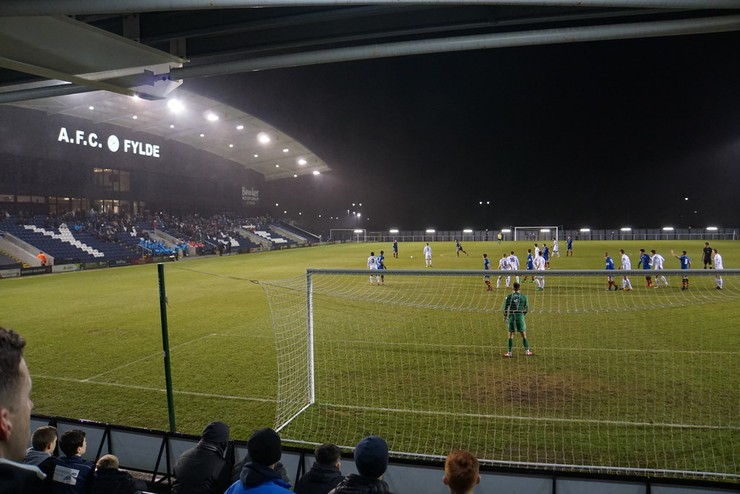
When the three qualification rounds are done and dusted and there are 78 teams left standing, this is when the competition formally begins. The draw is usually made around early November and it does not see the addition of any fresh teams. Instead, the 78 survivalists from the qualification rounds are randomly paired up for yet another winner takes all bout. The 39 teams that prevail progress to the second round proper and at this stage the 43 teams from the sixth tier of English football make their first appearance in the competition.
This means there are 41 second round fixtures to be played and subsequently 41 winners that make it to the third round proper. During the third round, we see the last batch of new entrants to the competition as here the 23 National League clubs are added into the draw. This very conveniently creates 64 teams, a number which when halved enough times will end with just two who will meet in the final.
So, from here on out, it is a simple matter of a straight knockout with all remaining teams. Those that survive move onto the next round and those who lose are eliminated without hope of a reprieve. The last 64 (third round) becomes the last 32 (fourth round), then the last 16 (fifth round), then the quarter-finals, the semi-finals and then, of course, the match all teams hope to reach: the final.
The Final
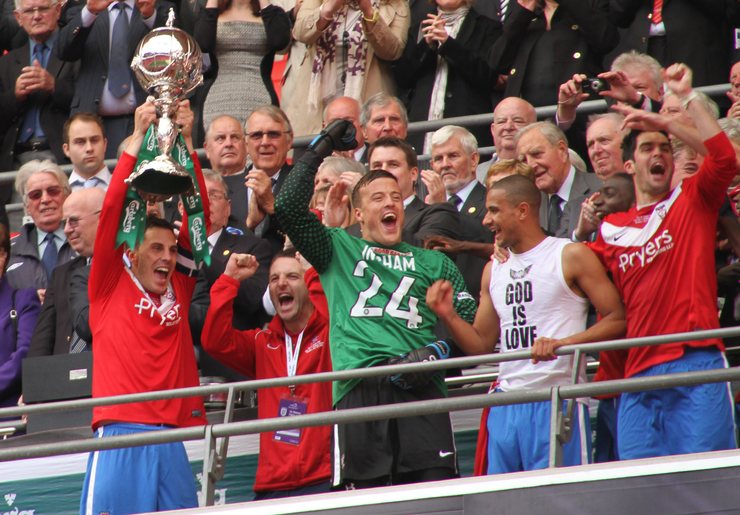
To reach the FA Trophy final, the fewest number of victories a team needs to record is five, this being for a National League side entering at the third round stage. For an eighth tier side though, they will have needed to string together nine or 10 successive victories to book their place at Wembley. In reality though, eighth tier sides never end up lasting this long, much like how a League One or League Two side struggle to survive all the way in the FA Cup. During the 2021/22 FA Trophy, a pair of eighth tier sides, Plymouth Parkway and Larkhall Athletic, did impressively reach as far as the fourth round proper but in both cases this is where their journey ended.
As mentioned above, the FA Trophy final traditionally takes place at Wembley. There have been a few exceptions to this though, most recently when new Wembley was being built so instead both Villa Park and West Ham’s Boleyn Ground did the hosting. Prior to this, Wembley would not host any final replays, something witnessed in 1983/84, 1986/87 and 1987/88. Although the original showdowns were played at England’s national ground, one replay took place at the Victoria Ground, formerly of Stoke City, while The Hawthorns took charge of the other two.
Attendances in the very early rounds of the competition are typically a few hundred, increasing to a few thousand by the time of the fifth round onwards. The final though, despite lacking any big-name teams, regularly attracts a huge turnout to Wembley.
Although there is a fair amount of variation year on year, in most seasons you can expect to see 30,000+ fans roaring on the teams. The record attendance was set shortly after new Wembley opened its doors with 53,262 fans seeing Stevenage Borough beat Kidderminster Harriers in 2007.
Incidentally, Kidderminster were also involved in an earlier attendance record when their 1991 final saw 34,832 spectators at the old Wembley. Sadly, the match had the same outcome for the Harriers who ended up losing by a one-goal margin.
Recent Changes
Prior to the global health crisis that kicked off in 2020, when matches finished level at 90 minutes, a replay, at the away team’s ground would take place at a later date to determine a winner. During the replay, should the sides end up all-square once again then extra time and, failing that, a penalty shootout would be called upon. The fixture congestion caused by the health-related postponements saw the (temporary) end of replays though with all matches settled on the day and not even with extra time. Up until the final, in the event of any draw, the two teams would head straight to a shootout. Only the very last match of the tournament retained extra time, if required.
Although this can be seen as a forced change to the FA Trophy for the 2020/21 and 2021/22 seasons, it is possible the FA will stick with it for future editions.
Previous Formats
There have been plenty of changes to the format of the FA Trophy over the years, some forced and some not. Previously there were no qualification rounds given that there were far fewer teams. Even at the start of the 21st century, there were fewer than 200 teams involved in the competition compared to more than 300 today.
Although it is hard to believe now, as per other FA competitions at the time, the Trophy saw replays across all rounds, including the final. Not only this, but whenever a replay ended up as a draw, teams would need to keep going with further matches until a winner was found. In the 1980/81 FA Trophy, the second round of qualification saw Netherfield and Bridlington Trinity play each other seven times before the former eventually prevailed. The final five replays all took place at Netherfield’s stadium so it meant a lot of traveling for the Bridlington boys in what was the longest FA Trophy tie ever seen.
Prize Money
The FA are very transparent when it comes to how much money clubs receive for winning each round, so much so that they publish it on their website. Although the sums involved may not sound like a lot, bear in mind competing teams are mainly at a semi-professional level so a few thousand pounds is not a trivial amount to receive. The amounts below are paid per round so should a team starting in the second round proper end up winning the final they will receive seven payments, totalling £102,000 (as of 2021/22). In theory, an eighth-tier team starting in the first round could pocket as much as £111,200 but they regularly find it difficult to win the competition, being among the lowest-ranked sides.
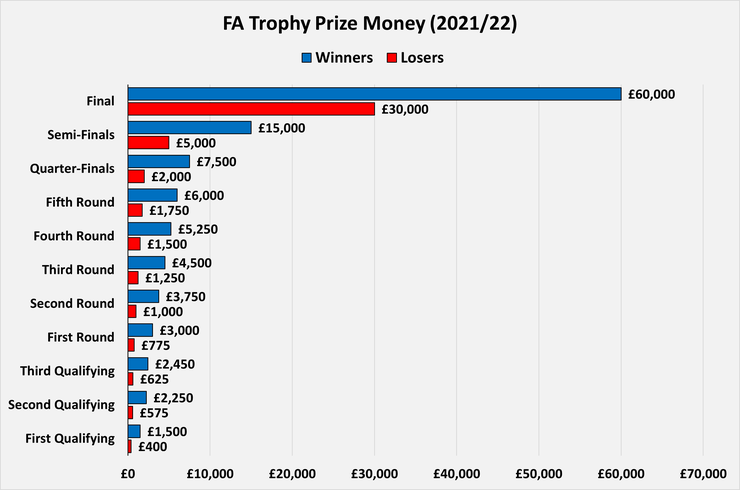
Most Successful Clubs
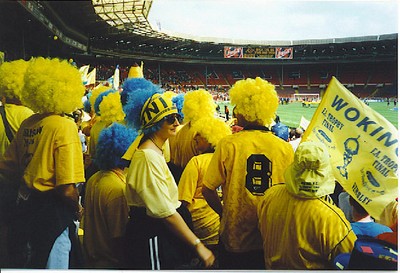
There are three teams tied at the top of the FA Trophy all-time leaderboard with three victories: Woking, Telford United and Scarborough. Only Woking have any hope of becoming the outright leaders though because Telford dissolved in 2004 and Scarborough suffered the same fate three years later. As it happens, Woking did have the opportunity to win a fourth FA Trophy in 2006 but for the first time in their history they ended up being defeated in the final.
Following this leading trio are 10 teams tied on two victories although some, like Wycombe, are no longer eligible for the competition due to promotion to the Football League. This partly shows the difficulty in winning this competition on multiple occasions as when a non-league side becomes too strong, they soon end up promoted, meaning they will take part in the EFL Trophy instead. Add in the sheer volume of teams involved each season and even three victories since the cup was introduced in the 1969/70 season is an impressive achievement.
Although success is regularly measured by the number of cups lifted, you could also argue that reaching the final is a big achievement in itself. When looking at final appearances, no team is yet to match Telford’s five although Woking, Scarborough, Stevenage, Macclesfield Town and Kidderminster Harriers all sit on four. Spare a thought for poor Runcorn town too. Prior to being dissolved in 2006 they reached three FA Trophy finals, only to lose them all. They are what you might consider the unluckiest team ever to have featured in this tournament although Grimsby Town and Kettering Town are only one defeat away from matching Runcorn’s unwanted record.
Records

We’ve discussed the most successful clubs in FA Trophy history above but there is other interesting information outside of this. For example, in 1985, Wealdstone become the first-ever team to win the National League (then Football Conference) and FA Trophy in what is known as the Non-League Double. Colchester United and Wycombe Wanderers then both managed to repeat the feat the following decade.
Now, this is an English cup competition, but as you are probably already aware, there are some Welsh teams found within the English FA system. Thanks to this there have been three non-English teams reaching the FA Trophy final: Bangor City, Newport County and Wrexham. Only Wrexham proved successful though, lifting the trophy in 2013. It is worth noting that Bangor City have no chance of avenging their 1984 final defeat as they have since moved to play in the Welsh footballing pyramid.
Generally, the history of this tournament does not feature any big names but a certain Martin O’Neill is one man with some real FA Trophy experience. When managing Wycombe between 1990 and 1995, he lifted the trophy on two occasions. In the first winning final, coming in 1991, Steve Guppy got himself on the scoresheet and the Winchester-born winger managed to register an England cap eight years on. It is incredibly rare for FA Trophy winners to reach such heights but it can happen now and again.
A special mention ought to go to Gary Hooper too. He lifted the FA Trophy twice but – more impressively – he holds the record for being the only player to have scored at least one goal in each of the top six tiers of English football, the FA Cup, the League Cup, the Champions League, the Europa League, the Scottish Premier League, the Scottish Cup, the Scottish League Cup and, of course, the FA Trophy. Which was the hardest to score in? You would have to ask the man himself.
History
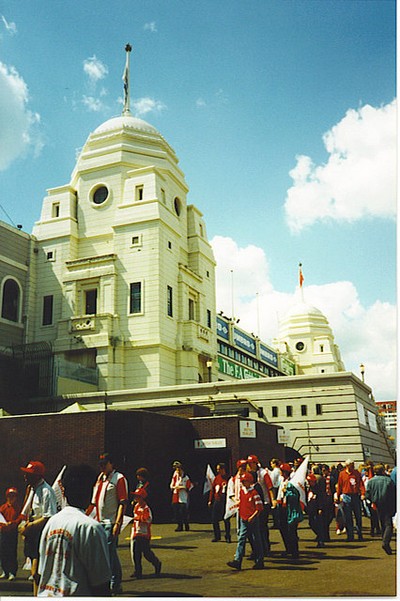
Before the creation of the FA Trophy, non-league clubs simply had no realistic prospect whatsoever of ever playing a match at Wembley. Seeking to change this situation, the FA Council set up the ‘FA Challenge Trophy’ in 1969. Macclesfield Town, who were then Northern Premier League champions, became the inaugural winners of the competition with the final bringing in 28,000 spectators to Wembley.
The newly founded competition proved to be relatively successful as many of the teams involved were ineligible to play in the FA Amateur Cup, which has existed since 1893. By paying any sort of salary to players, many non-league clubs were ineligible for this competition, but not the Challenge Trophy. When the Amateur Cup was later scrapped in 1974, as the FA abolished official amateur status, many of the top amateur teams joined the FA Trophy. The rest began playing in the FA Vase which was seen as more of a direct replacement. It was not until too long after, 1980 to be precise, that one of these former amateur clubs, Dagenham, won the FA Trophy
Northern Premier League clubs dominated early editions of the FA Trophy but this tournament struggled with prestige initially. The situation improved when the Amateur Cup was scrapped as this saw Trophy numbers increase to around 300. Another change that helped was that the final was scheduled for the Saturday after the FA Cup final. By stretching the tournament out, it impacted the league season less and meant more teams were willing to take it seriously.
Today, the FA Trophy is not only well-attended but a cup competition many sides take seriously. An increase in prize money has helped with this and this is something made possible through a series of sponsorship and TV deals across more recent years. In the 21st century, the competition has been sponsored by the likes of Umbro and Carlsberg and the final has even been televised on occasion too.